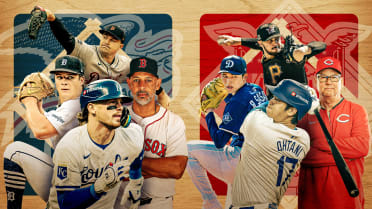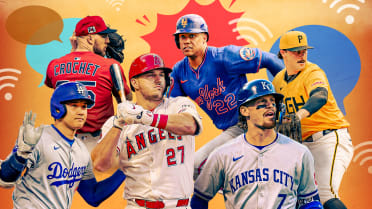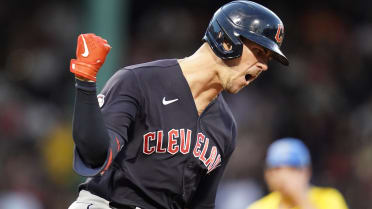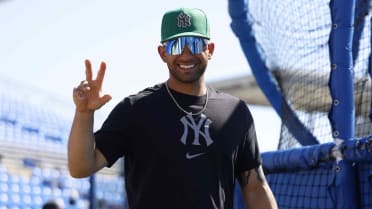The oddity of the position player pitching, the sight of a backup catcher or reserve outfielder or -- in those rare occasions where we found ourselves so lucky, a legitimate slugging superstar -- taking the mound was once reserved for the descriptive bin of "weird baseball," the kind of thing that happened only a few times a year. For most of post-integration baseball history, you'd see this maybe a dozen times a season, late in blowouts. As recently as 2005, it happened just one time. Even in 2013, there were only 14 such games. It was an entertaining diversion.
Then, as things do, they got out of control. In 2018, there were a record 75 appearances by position players on the mound. In 2019, that record was shattered with 90 such appearances. It got to such a state that for 2020, Major League Baseball stepped in and inserted new rules on the practice, clarifying that position players could only pitch in extra innings, or if their team was winning or losing by more than six runs. (This rule was later put on hold for the shortened 2020 season.)
It helped, some, though anything different about 2020 could be different for so many different reasons. Still, it seems clear that the era of the position player pitching is here to stay, so we thought we'd add the ability to search for that to the searchable Baseball Savant database -- here it is, a list of all 2020 pitches thrown by position players -- and use that to come up with some fun takeaways, dating back to 2008, when pitch tracking began.
Who's done this the most? Is anyone actually any good? How do they do overall? What about hitters against them? There's so much to get to here.
Before we can get to the fun, we have to answer a rough question.
What even is a position player pitching?
You'd think that'd be the easy part, right? Cubs slugger Anthony Rizzo threw a pair of pitches in 2018. The legendary outfielder Ichiro Suzuki threw an inning back in 2015. Endless numbers of backup catchers and infielders have toed the rubber. This shouldn't be hard.
Except, as it so often does, it gets complicated. We're in an era where Matt Davidson, owner of a pair of 20-homer seasons, wants to be a two-way player. Is Jared Walsh, who had a 158 OPS+ for the Angels this year, a two-way player when he takes the mound, as he did for five mostly ineffective outings? Or a position player pitching? What about Jason Lane, who got into 497 games as a position player between 2002-07, then resurfaced for three games on the mound in 2014? How many times does Cincinnati's Michael Lorenzen need to be in the outfield before he's a position player pitching, and not a pitcher playing a position? What about the king of them all: Shohei Ohtani?
It gets messy, quickly. The way we've defined this is to first (since 2008) find all players who have had at least one plate appearance both as a pitcher and as a batter, which came out to 1,601 names. Then, we compare each player's career totals of "plate appearances seen as hitter" to "plate appearances faced as pitcher," and anyone who has had less than 25% of their total plate appearances coming on the mound is not a pitcher, with a special exclusion to remove Ohtani entirely. These are our position players.
(For example, Madison Bumgarner has been the pitcher in 92% of the plate appearances he's participated in, and the hitter in 8% of them. Adam Wainwright is at 91.9% as a pitcher. These are clearly pitchers. Meanwhile, longtime catcher Russell Martin, who got into four games as a pitcher in 2019, was at 0.6% of his plate appearances on the mound. Clearly a position player pitching.)
Or, for a much more entertaining way to look at our 25% dividing line:
And that, friends, is why the line is at 25%. You've got a ton of real actual pitchers between 90% and 100%, a few position-switcher oddities (Adam Loewen, San Diego's Javy Guerra) just south of 90% ... and then an enormous gap until you get near 20% of plate appearances coming on the mound. No one's a true 50/50 type. (Baseball-Reference has a different definition, but also includes cases like Lane.)
So that's our line, imperfect though it may be. You might be able to quibble about an outlier here or there, but this is where we are. Now: What do these guys look like?
How much do position players get hit around?
You'd expect the answer to this to be "a lot," and ... well, we can't be clever. It's a lot.
Since 2008, here's the cumulative line allowed by position players pitching: .321/.399/.630. That's a .427 Weighted On-Base Average, or wOBA, and since the Major League average wOBA over the last three seasons has been .317, you know that is ... worse.
Let's give you a player comparison: Nelson Cruz. Over 2019-20, Cruz hit .308/.394/.626, which is pretty close. So if you want to say that position players pitching turn all of their opposing hitters into Nelson Cruz, that wouldn't be far off. (If anything, it's better than we thought. Cruz is still a human baseball player. We figured maybe it'd be more like an unattainable video game number.)
Position players on the mound have allowed 111 home runs off of 2,660 swings, or a dinger on 4.1% of swings. Meanwhile, pitchers as a whole have allowed a homer on 1.6% of swings. Position players pitching get a miss on 11% of swings, while all pitchers get a miss on 22.7% of swings. Limiting just since 2015 when Statcast data came around, position players allow a hard-hit rate (which is to say, balls hit above 95 mph of exit velocity) of 39.5% .. while all pitchers allow a 34.9% rate.
You get the idea here. It's not great! It's expected to be, of course. No one's thinking that position players on the mound roll up and find success. We're almost surprised it's not more brutal than that.
Which position player has thrown the most pitches?
You'd think this would be one of our position switching edge cases like Lane or Brett Eibner, and those kinds of guys are indeed second and third here, but no, at the top, the answer is a true position player.
167 pitches -- Chris Gimenez
150 -- Christian Bethancourt
141 -- Jason Lane
134 -- Andrew Romine
132 -- Hernán Pérez
Gimenez spent parts of 10 seasons in the Majors as a backup catcher/first base/left field type, eventually getting onto the mound 11 times. (It wasn't great: he struck out three and allowed five homers.) In 2017 with the Twins, he pitched six times. Gimenez knew the score, saying that "I know I can do it without getting hurt and not put somebody in a position where they're going to get sent down or released or anything bad happen to our team."
That, for the record, is almost exactly what Cleveland manager Terry Francona said in 2016 after using Gimenez. "If we wouldn't have [used Gimenez], we were going to have to make a roster move," Francona said in August of that year. "And, I don't think anybody deserved to lose their job."
While we tend to look at position players pitching as almost a sideshow, there's a value there that goes beyond the statline. It can be the difference between a teammate staying up or getting shipped out.
Have any position players pitching been any good?
Mostly not, as you'd expect, though a handful have made it through a perfect inning. If we set a minimum of 10 plate appearances, there actually have been some of these guys who did well. Let's look by lowest Weighted On-Base Average, or wOBA.
.161 wOBA -- Russell Martin
.173 -- Tom Murphy
.197 -- Aaron Miles
.202 -- Lane
.221 -- Alex Avila
For Martin, who got into four games for the 2019 Dodgers, that's a line against of .154/.154/.231, even striking out a pair of hitters in Austin Allen and Christian Walker. Martin actually threw four shutout innings, one at a time, for those 2019 Dodgers, at 36 years old. Is he the greatest position player pitching of all time? It's not up to us to say for sure, but yes, yes he is.
What's the hardest any of them have thrown?
You expect a ton of 74 mph meatball floaters, and trust us, there have been a ton of those, but there have been a handful who zipped it in there north of 93 mph. Almost like a real pitcher!
Here's where we run into edge cases, because the 40 hardest pitches have all come from two players: Christian Bethancourt, a two-way catcher/pitcher who topped out at 97.3 mph in a game in 2017, and Brett Eibner, a position-player-turned-pitcher who hit 95.8 mph in a game for the Marlins this summer.
If we set that pair aside, the hardest pitches list looks like this:
95.1 mph -- Drew Butera, 5/20/12
94.9 mph -- Butera, 5/14/14
94.7 mph -- Mitch Moreland, 5/6/14
94.5 mph -- Moreland, 5/6/14
94.2 mph -- Moreland, 5/6/14
94.1 mph -- Casper Wells, 6/28/13
93.8 mph -- Butera, 5/20/12
93.8 mph -- Moreland, 5/6/14
93.7 mph -- Charlie Culberson, 8/17/18
The slowest, for what it's worth, was probably so slow that it couldn't be tracked by whatever hardware was active at the time. The slowest tracked pitch, though, was all of 38.1 mph, when Brock Holt did whatever this was on Sept. 23:
Which teams have used it the most?
Here's a fancy graph.
OK, fair, some of the Padres total is from Lane and Bethancourt, but it's not just those two; they've also had Ty France, Ian Kinsler, Cory Spangenberg, Erick Aybar, Luis Sardinas, Alexei Amarista and Josh Wilson get in over the years, again dating back to 2008. (Amusingly, the Padres were one of the few teams not to use it at all in 2020.)
Is there a pattern here? It doesn't seem like there is, though the Giants notoriously refused to go to a position player for years under Bruce Bochy's leadership. When Pablo Sandoval entered to pitch on April 28, 2018 -- throwing a scoreless 1-2-3 ninth inning in a 15-6 loss to the Dodgers -- it was the first time they'd used a position player on the mound since July 4, 1991.
Which hitter has seen it the most?
This seems like it should be random, and maybe it is, other than "being on good offensive teams that cause blowouts a lot" and "playing for a long time."
38 pitches -- Kinsler
36 -- Brett Gardner
36 -- Joc Pederson
35 -- Austin Barnes
33 -- Dexter Fowler
Kinsler actually faced seven different position players: Jeff Mathis, Andrew Romine, Charlie Culberson, Michael Cuddyer, Jace Pederson, J.D. Davis, and Luke Maile. (He slugged .833, hitting a homer off of Davis.) Entertainingly, he was also used to pitch himself in a 2018 game for San Diego.
Which hitter has abused position players the most?
If we're going strictly by wOBA, it's Oswaldo Arcia, though it's not terribly satisfying: He faced one position player, Romine, and hit a homer. Hard to do better than that.
Let's instead look at number of hits, where it's a six-way tie at four apiece.
4 -- Sandy León
4 -- Justin Turner
4 -- Ian Desmond
4 -- J.D. Martinez
4 -- Mitch Moreland
4 -- Evan Gattis
We're going to arbitrarily give this title to León, because he faced four different position players once apiece, and look at all the damage he did against them:
2018, vs. Butera: RBI single
2018, vs. Jace Pederson: double
2019, vs. Stevie Wilkerson: homer
2019, vs. Romine: two-run homer
What makes this all the funnier is that Leon has objectively been one of the weakest hitters in baseball for almost his entire career. Even with a wildly flukish 2016 on his resume, León's career line of .216/.284./327 since his 2012 debut is the fifth-weakest of the 487 different batters to collect at least 1,000 plate appearances. What if they just made the entire pitching staff out of position players, he's probably asking.
Which hitter actually didn't do well against a position player?
Can you imagine being a professional hitter, someone who has been trained to handle 98 mph fastballs and biting sliders in the dirt, coming up against a fill-in pitcher ... and failing? Well, you need not imagine. We're going to give you two ways to look at this. First, despite the fact there's something like a billion-way tie for "hitless batters against position players pitching," many of those came in just one or two opportunities. This group, however, has the most unsuccessful opportunities:
7 -- Chad Pinder
6 -- Dexter Fowler
6 -- Cody Bellinger
6 -- Jake Marisnick
Pinder, unlike the others here, actually has reached base once, but it's hardly a badge of honor, since it came when Tigers infielder Brandon Dixon hit him with a pitch in 2019. Otherwise, he's hit six balls in play, all of which turned into outs.
One thing Pinder didn't do, however, was strike out, which seems like the ultimate insult. That's the other way we'll look at this. Which hitter has struck out the most often against these impostors? Turns out, it's a seven-way tie with two apiece, and there's some legitimate names here.
2 -- Marcus Semien
2 -- Dylan Moore
2 -- Neil Walker
2 -- Adam Duvall
2 -- Austin Barnes
2 -- Roberto Perez
2 -- Shin-Soo Choo
The "prize," such as it is, probably goes to Walker, who is the only man on record to strike out twice in a single game against a position player pitching, though since that came against Lane in his brief 2014 return, you might prefer not to count that.
What's the best single outing from a position player pitching?
This is probably Lane, when he threw three scoreless innings in June of 2014, but again, his status here is iffy, so let's set him aside.
If it's "best performance over the most batters," then maybe we're looking at Alex Avila, who set down six of seven Rockies he faced on July 11, 2018, in Coors Field, no less . If it's "most strikeouts in an outing," Lane and Eibner aside, plenty of position players have whiffed two in one outing.
We're going to lean into being arbitrary on this one, and highlight two of our favorites. (Your mileage may vary.) Does it get much better than a position player striking out one of baseball's most dangerous hitters, as Davidson did to Giancarlo Stanton with a nasty curveball in 2018? Hard to think that it does.
Let's also go back to 2014, when Marcell Ozuna was breaking out with a 23-homer 114 OPS+ season at age 23. On May 14, his Marlins were in the midst of beating the Dodgers 13-3, when he came up to face Butera with two outs in the ninth.
It went like this ...
90.9 mph fastball, swinging strike
74.7 mph breaking ball, swinging strike
94.9 mph fastball, swinging strike
"Is that 94 on the gun?" Vin Scully asked while Zack Greinke cackled from the dugout. "Well, that's the brightest moment since the game started."
"I blacked out, I don't know what happened," Butera told Eric Stephen of SBNation. "I was trying to not to get hurt and throw strikes. My last hitter was Ozuna and I had an 0-2 count, so I figured why not let one go?"
Why not, indeed?
Mike Petriello is a stats analyst for MLB.com, focusing on Statcast and Baseball Savant, and is also a contributor to MLB Network.




